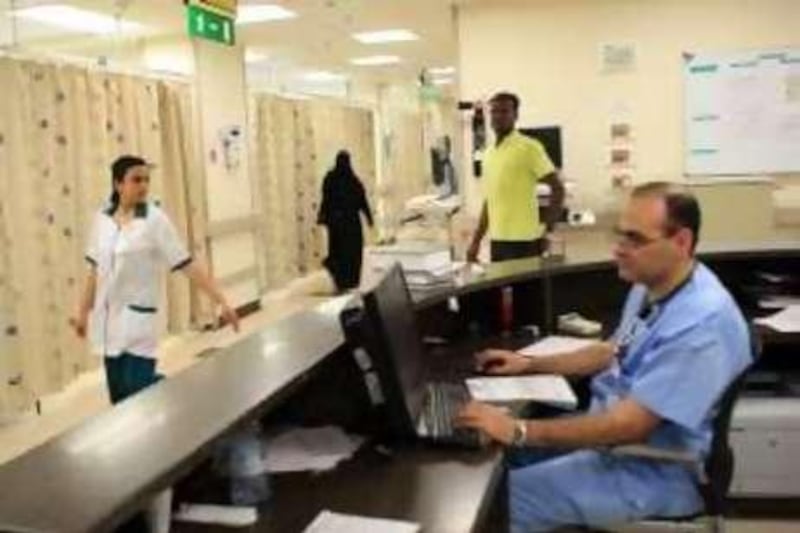The UAE's most high-tech hospital needs to find almost 100 doctors and 300 nurses amid a local and global shortage of medical staff before it opens in 2013, its chief executive said. The new Mafraq Hospital will replace the existing facility - but to do so it needs to increase its workforce by between 30 and 35 per cent.
The chief executive, John Nickens, said it will rely heavily on word of mouth and Bumrungrad International, the company that manages the hospital, to find the additional employees. But he added the facility - located 35 kilometres from the capital - is on track to open on schedule. "There is always a shortage of staff," Mr Nickens said. "There has been a shortage for as long as I have been in this industry, 25 years."
He said the major challenge was managing the multitude of cultures that pass through the hospital's doors. "Our patients are from many different parts of the world. We have to cater for this when it comes to the staff," Mr Nickens said. The old and new hospitals will need to run in parallel for at least a year while staff and patients are transferred, he added. The new hospital will open with 499 beds and 250 more are planned. Staff will also need to be recruited to work in a separate women and children's pavilion, a new sleep clinic and VIP floors. According to the Health Authority-Abu Dhabi (HAAD), the number of doctors and nurses in the capital needs to double over the next decade.
Hospitals have previously complained that their efforts to hire more staff from abroad are hampered by long and bureaucratic licensing procedures. "The population in our catchment area is growing at about five per cent a year," said Mr Nickens. Most of the growth is expected to be off-island, and therefore in Mafraq's natural catchment area. "In future, 60 per cent of the population of [central] Abu Dhabi will be living here, and the remaining 40 per cent on the island.
"When that happens, the new Mafraq Hospital will be in the most populated part of the emirate. It needs to grow." The hospital has 308 doctors, 792 nurses and 392 beds. It already has one of the biggest trauma centres in the country. About half its inpatients start their stay in the casualty ward. Emergency staff treat the victims of at least two road crashes every day and they handle a significant number of patients injured on construction sites.
"It could be a bus of 20 people, or a bus of 50," Mr Nickens said. "Every single day of the year there is an industrial accident victim brought to the trauma centre, sometimes more than one." There are 20 private cubicles in the old hospital's trauma centre, with another 14 under construction. The new hospital will have 46 cubicles. According to Dr Biniam Tesfayohannes, the head of the emergency department, up to 80 per cent of the injuries his staff see could have been prevented with better education and tighter safety control.
In summer, there is an influx of patients suffering dehydration and heat stroke. Although companies are legally obliged to provide workers with water and rehydration salts, and give them a midday break, Dr Tesfayohannes said there were still a handful that "slip through the cracks". "At the moment we see between 25 and 35 people," he said. "It can range from people complaining of heat cramps in their muscles, to people being unconscious."
At least one or two people a week are admitted to intensive care because of severe heat stroke, which can be fatal. Other injuries, such as those from road crashes or falls from heights on construction sites, are also preventable. "It is maddening to see a child hurt in a car that is safe," Dr Tesfayohannes said. "This is down to seat belts. A lot of the children are in heavily protected cars, and the roads are good. This shouldn't happen.
"I would say that 70 to 80 per cent of our trauma work would not happen with primary prevention."
munderwood@thenational.ae





